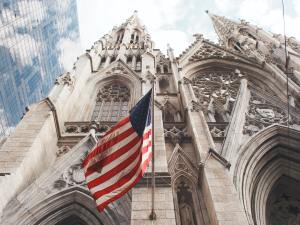Of Good Leaders and Society’s Safety
June 30, 2021 Leave a comment
Photo by Megan Thomas on Unsplash
The story is told in The Book of Mormon of a society in ancient America that was under constant threat and frequent attack from another people who were fierce and far more numerous. They were also related, which made hostility acute and seemingly ineradicable—save one should eradicate the other.
Like everyone in the western hemisphere their roots were planted by immigration. These immigrants from the Old World were largely from two interrelated families. They barely got along while the founding patriarch, Lehi, lived. When he died, leadership succession threatened bloodshed. Rather than fight it out, one group, led by a younger son, Nephi, left. The other group, which over time became larger, was led by the eldest son, Laman.
The two societies could hardly be more different, because their leaders, though brothers, could hardly be more different. Laman was opposed to emigrating from the Old World. Lehi was given a prophetic charge to leave. God told Lehi (who like his contemporary, Jeremiah, was a prophet of Christ) that his city, Jerusalem, was doomed, descending into social disorder and vulnerable to predictable conquest. Laman doubted the prophecy. Nephi, supporting his father, was given divine confirmation of the Lord’s warning.
In Lehi’s day the differences were occasionally resolved, but only superficially. Laman, and those who listened to him, having little faith in his father’s prophecies, only with reluctance cooperated. Nephi believed. With that faith, confirmed by his own communion with the Lord, Nephi was instrumental in facilitating the pilgrimage to what the Lord vouchsafed Lehi and his family would be a promised land.
For centuries following Lehi’s death, both sides tried, in their characteristic idioms, to bridge the schism. The people of Nephi, according to the record, devised “many means to reclaim and restore” the people of Laman “to the knowledge of the truth”. Their record reports, on the other hand, that the people of Laman “sought by the power of their arms to destroy us continually.” (Jacob 7:24)
Which would prevail? In terms of reunification, neither succeeded for more than four hundred years. Measured by prosperity, the people of Nephi flourished. While the chronicle is brief, it describes a society as advanced as any global contemporary of the fourth century B.C.:
And we multiplied exceedingly, and spread upon the face of the land, and became exceedingly rich in gold, and in silver, and in precious things, and in fine workmanship of wood, in buildings, and in machinery, and also in iron and copper, and brass and steel, making all manner of tools of every kind to till the ground, and weapons of war. . . and all preparations for war. (Jarom 1:8)
Compare that with the description of the people of Laman, who fell into degradation:
. . . they became wild, and ferocious, and a blood-thirsty people, full of idolatry and filthiness; feeding upon beasts of prey; dwelling in tents, and wandering about in the wilderness with a short skin girdle about their loins and their heads shaven; and their skill was in the bow, and in the cimeter, and the ax. And many of them did eat nothing save it was raw meat . . . (Enos 1:20)
By one gauge, the people of Laman exceeded the people of Nephi, “they were exceedingly more numerous”.
The moral of the story is this. The people of Nephi prospered, not only materially and socially, but they also succeeded in holding their enemies at bay, enemies whose hostility was implacable, constant, and fierce, and who were “exceedingly more numerous”. How so? The crowning message inscribed in the ancient records of the people of Nephi was that their kings and leaders “were mighty men in the faith of the Lord”. Thereby the people were led in safety. That is a vital message for our society, or any society.


